In 2018, business and civic leaders in Colorado aligned around Vision 2030, the competencies, skills, experiences and foundational principles our K-12 education system needs to ensure agile learners. Today, after more than two years of a global health crisis, there are few words more relevant for our time than agility.
That’s especially true for our K-12 schools. Since March 2020, educators and students have needed a mindset agile enough to pivot and change on a dime. When COVID-19 shuttered our schools, we witnessed in a matter of weeks a seismic shift toward creating a learner-centered system, one based on the fundamental belief that learning happens everywhere.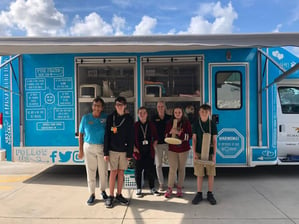 It’s something I’ve seen firsthand across Colorado — learning providers who fully realize the value to students of offering educational opportunities that can be experienced. I’ve visited educators across the state who, even during COVID-19, are partnering with community organizations, nonprofits, local employers and civic leaders to offer real-world learning experiences. And for many of the students I’ve met these opportunities provide a sense of authenticity in what they’re learning while also providing context and purpose for their larger educational experiences.
It’s something I’ve seen firsthand across Colorado — learning providers who fully realize the value to students of offering educational opportunities that can be experienced. I’ve visited educators across the state who, even during COVID-19, are partnering with community organizations, nonprofits, local employers and civic leaders to offer real-world learning experiences. And for many of the students I’ve met these opportunities provide a sense of authenticity in what they’re learning while also providing context and purpose for their larger educational experiences.
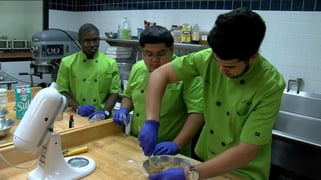
We call this work-based learning, but I think it’s time to just call it learning. It’s simply what’s required of today’s school. Work-based learning must become part of everyday learning for students to have a more relevant and engaging school experience.
Educators who provide the conditions necessary to support this learning are leading the way. Instead of asking kids what they want to be when they grow up, entrepreneurship education, for example, asks them what problems they want to solve. Because let’s face it: we’re going to rely on the students in our classrooms today to be the inventors and innovators of tomorrow.
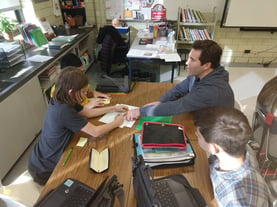
We now recognize that real learning doesn’t just take place when a teacher is standing in front of a classroom. It also can happen when local entrepreneurs and industry professionals serve as coaches or subject matter experts in the classroom. And learning can occur away from the school’s physical setting, when students work with mentors guiding teams and providing advice and feedback as student teams navigate decision-making on the entrepreneurial journey. What really matters isn’t where learning takes place, but whether the experience is authentic.
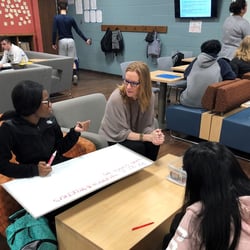 Take, for instance, INCubatoredu@Northfield in Denver Public Schools. During the year-long course, teams of students create a product or service using the Lean Startup method. The teams identify a problem in their community. This requires students and their schools to form deep connections with the business and civic community. Entrepreneurs and business leaders visit classrooms to guide students as they turn an idea into a product or service. Students embed with those entrepreneurs to gain first-hand knowledge of the process.
Take, for instance, INCubatoredu@Northfield in Denver Public Schools. During the year-long course, teams of students create a product or service using the Lean Startup method. The teams identify a problem in their community. This requires students and their schools to form deep connections with the business and civic community. Entrepreneurs and business leaders visit classrooms to guide students as they turn an idea into a product or service. Students embed with those entrepreneurs to gain first-hand knowledge of the process.
It’s learning through and about work to develop a sense of curiosity and purpose in one’s educational journey.
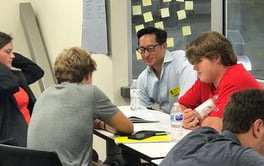 For schools and districts, this is about offering something more than one teacher helping students learn more about how the business world operates, or holding a career day where an entrepreneur spends 15 minutes discussing the process. It requires a systemic approach, created through the lens of whole-child/student well-being. It means designing a system that allows entrepreneurs to work regularly with students, being comfortable with students going out into the community to learn, and creating whatever policy decisions are needed to make it work.
For schools and districts, this is about offering something more than one teacher helping students learn more about how the business world operates, or holding a career day where an entrepreneur spends 15 minutes discussing the process. It requires a systemic approach, created through the lens of whole-child/student well-being. It means designing a system that allows entrepreneurs to work regularly with students, being comfortable with students going out into the community to learn, and creating whatever policy decisions are needed to make it work.
In other words, it requires that students, teachers, district leaders and the business community all have agile mindsets. The results are worth the effort.
COVID-19’s disruption of learning in March 2020 revealed what many of us already knew: more and more students, especially those in high school, have struggled to find personal relevance in what they’re learning. They’re disengaged, have dropped out or haven’t fully planned for what happens beyond high school.
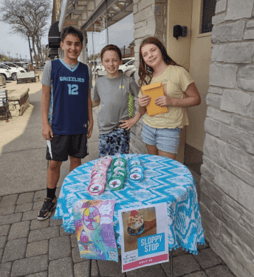 But when students are designing their own learning experiences, as they do in student entrepreneurship courses, they’re more engaged and enthusiastic. When students are exploring their passions and interests, when they are building learning experiences that are designed to give them hope and optimism for their future, that’s some of the most powerful learning opportunities to witness.
But when students are designing their own learning experiences, as they do in student entrepreneurship courses, they’re more engaged and enthusiastic. When students are exploring their passions and interests, when they are building learning experiences that are designed to give them hope and optimism for their future, that’s some of the most powerful learning opportunities to witness.
Educators across the state tell me that entrepreneurial learning gives students a deeper experience than the more traditional lecture-style approach. It reinvigorates educators as professionals, connects them to new experts and partners in learning, and validates their expertise as teachers and facilitators.
We’re in a moment of real opportunity. We can take the last two years and ignore its lesson, or we can understand that our students deserve so much more. The innovator in me can see what’s possible for our students. And the potential is limitless.
Shannon Nicholas is Chief of Staff for Colorado Succeeds, a nonprofit, non-partisan coalition of business leaders committed to ensuring all Colorado’s children are educated to their greatest potential and that all Colorado businesses have the homegrown talent they need to thrive.